- Home
- Leslie Meier
Silver Anniversary Murder Page 2
Silver Anniversary Murder Read online
Page 2
When she’d finally folded the last bag and tucked it away with the others in her bag of bags, she sat down at the round, golden oak kitchen table and considered making herself a cup of tea. Entirely too much work, she decided, opting instead for a glass of water. She sipped it thoughtfully, thinking of Sylvia’s challenge: could she possibly fit into her wedding dress? Setting down her glass, she decided she had to find out.
The dress, shrouded in a garment bag, hung in the back of her closet. She hadn’t looked at it in years, had almost forgotten about it. Like most mothers, she had a vague hope that one of her daughters might wear it for her wedding, but so far that hadn’t happened. Even Elizabeth, her oldest, who worked for the tony Cavendish Hotel chain and was currently living in Paris, hadn’t shown any interest in marriage, much less in wearing her mother’s dress. It probably wouldn’t suit her, thought Lucy, climbing the steep, back stairway that led from the kitchen to the bedrooms on the second floor. She would surely want something more high fashion.
Entering the bedroom she shared with Bill, Lucy opened the bifold closet doors, which stuck a bit and which Bill kept meaning to fix. She slid the clothes along the rod until she came to the long garment bag, which she pulled out and laid on the bed, then unzipped it to reveal the white dress.
It was a simple design with short sleeves and a jewel neckline. The bodice was made of Alençon lace, ending in a slightly raised waist. The full skirt was heavy satin ending in the slightest suggestion of a train, and fastened with a wide ribbon sash at the waist. It was slightly crushed from hanging in the closet all these years, and the veiled headpiece, which she had tucked into the bottom of the garment bag, was flattened.
She took it out, reshaping it with her hands, and set it on her head, fluffing out the white tulle veil, and looked in the mirror. She was much older now, but if she brought the veil forward, over her face, she almost looked like the young woman in the wedding picture that stood on Bill’s dresser. But not quite, she decided, snatching the coif off and tossing it on the bed.
Picking up the dress, she held it at arm’s length and studied it. It was a pretty dress but nothing like the strapless sheaths the girls wore these days, and not like the heavily beaded and hugely skirted cream puffs that had been fashionable for a while. Turning to the full-length mirror on the back of the bedroom door, she held the gown against her body and sighed. It was obvious, without even trying it on, that she could never fit into it. She wasn’t fat, not by a long shot, but she’d given birth to four children, and she’d breast-fed them all. Her body had changed and she was no longer the little slip of a thing who had worn that dress.
Standing there and studying her reflection, she thought it wasn’t just her body that had changed; she had changed, too. She was much more confident these days and much more assertive than she had been as a young bride. She was more open-minded, too, and less opinionated. Back then, she thought, she’d been a bit of a prig, convinced there was a right way to do things and a wrong way. Nowadays she was no longer convinced that food colorings were poison, that childbirth had to be natural, and all plastic should be banned.
She realized now that her strongly held beliefs had been a defense against an uncertain world. That had become obvious when she stepped inside the church vestibule on her wedding day and panicked, completely terrified to take that first step down the aisle to the altar where Bill was waiting for her.
“Ready, sweetie?” her father had asked, cocking his elbow and inviting her to take his arm.
Not at all, she’d realized, wanting only to turn tail and run right out the door. She would have fled, she remembered, except for the fact that everything was going black and she was about to faint. It was Beth Gerard, her best friend and maid of honor, who had produced from somewhere a brown paper lunch bag, which she gave to Lucy, instructing her to breathe into it.
Dad had held her up as Lucy breathed in and out, deep breaths, into the paper sack. “I thought this might happen,” said Beth.
“I can’t do this,” said Lucy. “The wedding’s off.”
“It’s rather late for that,” said her father.
“Look, if it’s no good, you can get a divorce or an annulment. But today, you have to get married,” said Beth.
“It’s not Bill, it’s me. I can’t go down that aisle.”
“Oh, yes you can,” said Beth. “Just imagine they’re all naked.”
Standing there, in front of her mirror, Lucy smiled, just as she had on her wedding day when she followed Beth and the other bridesmaids down the aisle on her father’s arm. Afterward, everybody said they’d never seen such a radiant, happy bride.
It was time, thought Lucy as she replaced the dress in the garment bag, to call Beth. She hadn’t spoken with her in a long time, and she knew Beth would love hearing about the Bickersons and reminiscing about the wedding. No time like the present, decided Lucy, knowing that unless she made the call immediately the moment would pass and she would be distracted and forget. She perched on the side of her bed and picked up the phone from the bedside table, punching in the number she knew from memory.
The voice that answered wasn’t Beth’s; it was male.
“Is Beth there?” asked Lucy, puzzled.
“I’m afraid not. Who’s calling?”
“I’m an old friend, Lucy Stone. Could you please tell her I called?”
“I’m afraid not, Lucy,” said the voice, which was close to breaking. “This is Dante.”
Lucy knew Dante was Beth’s son, whom she remembered as a skinny, mischievous kid. Now, from his deep voice, it was clear he was all grown up. And it was also clear to her that something was wrong. “Is everything all right, Dante?”
“No. It’s not. Oh, Lucy, everything’s wrong.” He gasped, letting out a sob. “My mother is dead.”
Chapter Two
Dead? Beth dead? That couldn’t be right. How could that be?
“I can’t believe it,” said Lucy, feeling her world turning upside down. “What happened? When? Was she sick? She never mentioned . . .”
“They say it was suicide. She jumped off the balcony yesterday morning. . . .”
Lucy knew Beth lived—no, had been living—in a high-rise penthouse in New York City. Sitting there in her bedroom, phone in hand, Lucy envisioned Beth taking that final leap, falling through the air and landing in a crumpled, bloody heap on the sidewalk, and was horrified. She could only imagine what Dante was going through.
“Oh, Dante, I am so sorry.” Lucy gripped the handset so tightly that her knuckles turned white. “I can’t believe it.”
“I wish there was a better way to tell you.”
“There’s no good way for something like this.” Lucy choked back a sob as tears filled her eyes.
“I know you’re upset so I won’t keep you. It looks like the funeral will be Saturday morning at St. Andrew’s.”
Lucy had grabbed a wad of tissues from the box on her nightstand and was wiping her face. “I’ll try . . .” was all she managed to get out before breaking down entirely, hitting the end button and collapsing onto the bed. Lucy wasn’t a crier, although sometimes she did have to blink back a few tears. But she hadn’t really cried in years, not like this, sobbing and wailing and producing floods of tears. She couldn’t fight it . . . she simply had to go with it until the storm ceased, leaving her aching and empty. Moving slowly and painfully, like an old woman, she finally got up off the bed only to find herself standing on the little hooked, bedside rug without a clue what to do with herself.
She moved to the window and looked out, surprised to see that nothing had changed in the yard. The neat rows of vegetable seedlings were still sprouting in the garden, the grass needed mowing, and a couple of robins were busy hunting for worms to feed their nestlings. Beth had died and nothing had changed. Beth had died and everything had changed.
Beth had been her first and best friend. Lucy couldn’t remember how or when they’d first met; it seemed Beth had always been there. They�
��d been in the same classes all through elementary school, they’d gone to the same church and Sunday School, and they’d gone to the same high school, where they both adored French and hated algebra. They went to different colleges, but the first thing they did when they got home for vacation was get together to compare notes on everything: boys, classes, clothes, hair, music, movies. Lucy never quite knew what she thought about these things until she’d thoroughly discussed them with Beth.
Beth was the leader of their gang of two; she was the one who initiated things. She was the one who convinced Lucy to skip school in favor of a ride on the Staten Island Ferry one early June day when the weather was simply too beautiful to miss. And it was Beth who dared Lucy to shoplift a pair of earrings from Fuhrman’s Department Store, earrings Lucy still had and always felt guilty about whenever she caught sight of them in her jewelry box. But Beth was also the one who knew which bands were cool and which were not, who would share her lunch if you forgot yours, and who would keep a secret forever.
That’s why she’d felt quite lost when Beth suddenly announced she was quitting college to join a religious cult, the Angel Brigade. Lucy had suspected at the time that Beth’s sudden religious awakening was less about a genuine conversion to the Brigade and more about the cult’s remarkably handsome and charismatic leader, Gabriel Thomas. Whichever it was, it meant that Beth had dropped out of her life, essentially abandoning her.
Beth only stayed with the cult for a year or so, long enough to become pregnant with Gabriel’s son, Dante, and much too long, as she put it, to tolerate his infidelity. But although the divorce meant she was back in Lucy’s life, it was never the same as before. They stayed in touch, through annual Christmas cards and occasional phone calls, but there was never the same closeness as they followed their own diverging paths. Lucy married Bill and they moved to Maine and raised a family; Beth stayed in the city with her only child and proceeded to work her way through three more husbands. In truth, Lucy had never really gotten over Beth’s sudden decision to join the cult, which felt to her like desertion.
And now, suicide. That was the ultimate betrayal, thought Lucy. Suicide was a huge slap in the face to everyone who loved you, to family and friends who would forever wonder why their love wasn’t enough. It left survivors with a huge burden of guilt, always questioning what they could have done differently, and whether they could have prevented that final, desperate act.
Still standing by the window, Lucy noticed a flash of color, a male robin who was fighting with his reflection in the shiny, black Weber grill. What foolishness, what vanity, she thought, as the little fellow strutted and flapped and feinted at his own image. It reminded her of Beth, the way she never passed a mirror without checking her appearance. Her first act upon arrival anywhere, was a quick stop in the ladies’ room to check her hair and apply fresh lipstick. There was no way, she thought, that Beth would hurl herself to destruction off a twenty-two story building. She was impulsive and emotional, sure, but she had recently invested many thousands of dollars in a face-lift and Lucy knew her friend would never risk damaging that newly firm chin line.
Lucy sat down on the side of the bed and reached for the phone once again, this time calling Sam Blackwell, another childhood friend who had also been one of her bridesmaids. Sam still lived in New York and had remained friendly with Beth, occasionally meeting her for lunch or an art exhibit.
“I was just going to call you,” said Sam. “I guess you’ve heard.”
“I can’t believe it.”
“I can’t make any sense of it either. Beth was emotional—she had lots of highs and lows—but I never thought she’d do something like this. I saw her just a week or two ago. . . .”
“Was she depressed?” asked Lucy.
“Not at all. If anything she was kind of up. We were having lunch at this new soup place and she was really excited that they had mulligatawny soup.” Sam paused. “Maybe too excited, now that I think about it. Maybe she was losing her grip and becoming unstable. I just thought it was Beth being Beth. Now I wonder if I could have said something or done something that would have made a difference.”
“Don’t blame yourself. It doesn’t change anything.” Lucy remembered reading somewhere that people who were considering suicide often became remarkably cheerful and upbeat once they’d made the decision to kill themselves. The article went on to say that this change often fooled others, serving as a smoke screen.
“I just keep going over and over everything she said, trying to remember if there was some indication. . . .”
“Even if there was, what could you have done?”
“I know,” admitted Sam. “I fantasize about grabbing her and carrying her off to safety. I see myself pulling her back off that awful balcony. Last night I had nightmares about nets and trampolines and bungee cords, anything that might have saved her, but they always failed and she ended up smashed on the sidewalk.”
“Maybe you should talk to a therapist,” said Lucy.
“Brad’s been suggesting that for years,” admitted Sam, referring to her husband. “It’s been a bit of a running joke.”
Lucy decided it was time to get serious. “Are you going to the funeral?”
“Of course. Are you? It’s probably going to be Saturday or Sunday.”
“I spoke to Dante and he said probably Saturday. I’ll fly down, but I need a place to stay. . . .”
“Oh, sorry, Lucy, no can do. We’re not in our apartment; it’s being renovated. We’re getting rid of those old moldings on the walls. I’ve hated them for years, you know. New floors, updated kitchen and baths, the whole shebang. Everything’s topsy-turvy, the furniture’s in storage, and Brad and I are in an extended stay hotel.” She paused for breath. “I don’t think it’s full. I could make a reservation for you, if you want.”
Lucy was flummoxed. She hadn’t anticipated this. She’d just assumed she could stay at Brad and Sam’s roomy prewar apartment on Riverside Drive. Now she was faced not only with the cost of a last-minute airplane ticket but would also have to pay an exorbitant rate for a New York hotel room. “I guess so,” she decided, swallowing hard.
“Consider it done,” said Sam. “I’m so glad you’re coming, Lucy. We can have a good cry together.”
“Something to look forward to,” she said wryly. “See you soon.”
After ending the call, Lucy tried to focus on everyday chores like emptying the dishwasher, making supper, and setting the table, but found herself standing like a statue, plate or pot in hand, wondering what she was supposed to do with it. Sara and Zoe came home, but were occupied with cell phones and didn’t notice their mother’s odd behavior. Bill, however, was immediately concerned, puzzled by the lack of dinner preparations.
“What’s for supper, Lucy?” he asked, sitting down on one of the kitchen chairs and proceeding to unlace his work boots.
“Supper?” repeated Lucy.
“What’s the matter?” he asked, looking at her suspiciously.
“My friend Beth died,” she said, wiping her eyes. “It was suicide.”
“That’s terrible,” he said, hopping up with one shoe on and one off and taking her in his arms.
Lucy nestled against him, feeling his beard on her forehead and resting her head on his shoulder. It was at times like this, she thought, that she really appreciated her husband. He was a rock, someone she could count on to support her in times of trouble. She slipped her arms around his waist, hugging him.
“So,” he said, clearing his voice and pulling away to hop back to the table, where he sat down and started unlacing his remaining boot. “I guess this means it’s pizza for supper.”
* * *
Next morning, Lucy’s friends agreed that husbands and children were not reliable sources of emotional support. That was one reason the four women had continued their weekly Thursday morning breakfasts at Jake’s Donut Shop, setting aside time for sharing good things and bad, offering advice, and sometimes simply listening and ca
ring. This morning, Lucy had found her friends reliable as ever, offering sympathy and clean tissues.
“Sara and Zoe never knew Beth, so I didn’t expect them to understand,” said Lucy, who had wiped her eyes, blown her nose, and recovered enough to take a sip of coffee. “And Bill never much liked her, back when we were dating.”
“That’s typical, when a romantic relationship becomes serious,” said Rachel Goodman, who’d majored in psychology and never got over it. “He would have seen her as a rival for your affection and attention.”
“Men have two speeds,” said Pam Stillings, whose experience as a cheerleader in high school had given her a rather jaundiced view. “Sex and sports. The rest is uncharted territory for them.”
“I still can’t get over the fact that she jumped off that terrace. Not after all that plastic surgery you said she’d just had,” said Sue, tucking a lock of glossy black hair behind her ear with a freshly manicured hand. Sue was the fashionable member of the group, whose husband, Sid, claimed that he went into the customized closet business when faced with the need to accommodate his wife’s ever-expanding wardrobe.
“And now I’ve got to go to the funeral, which is turning out to be very expensive,” said Lucy, looking up as Norine, the waitress, approached with their breakfast orders. “It’s not just the airplane ticket; I’ve got to stay in a hotel. My friend Sam can’t put me up. She’s having her place renovated.”
“Here you go, ladies,” said Norine, passing a Sunshine muffin to Rachel, granola-topped yogurt to Pam, and hash and eggs to Lucy. “As for you,” she said, giving Sue the evil eye, “I suppose you’ll want more coffee.”
“If it’s no trouble,” said Sue, smiling sweetly. As far as Lucy could tell, Sue existed on a diet of black coffee and white wine.

 Christmas Card Murder
Christmas Card Murder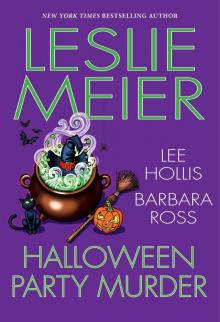 Halloween Party Murder
Halloween Party Murder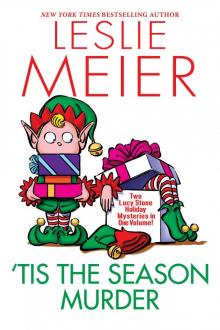 'Tis the Season Murder
'Tis the Season Murder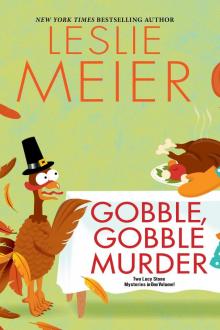 Gobble, Gobble Murder
Gobble, Gobble Murder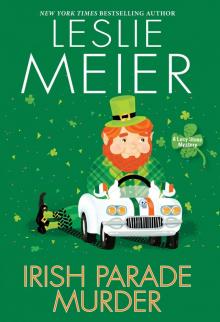 Irish Parade Murder
Irish Parade Murder Bake Sale Murder
Bake Sale Murder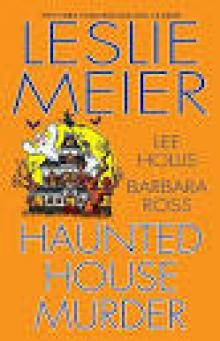 Haunted House Murder
Haunted House Murder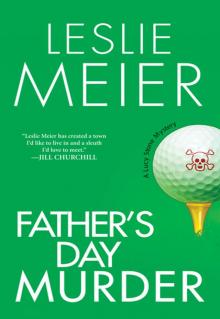 Father’s Day Murder
Father’s Day Murder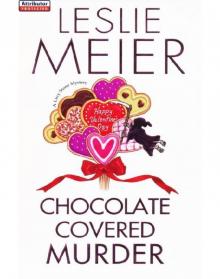 Chocolate Covered Murder
Chocolate Covered Murder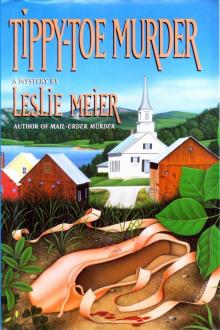 Tippy Toe Murder
Tippy Toe Murder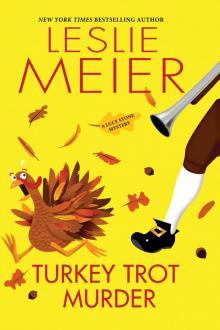 Turkey Trot Murder
Turkey Trot Murder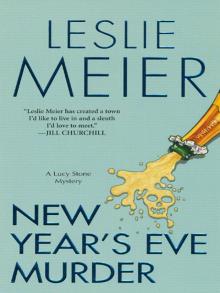 New Year's Eve Murder
New Year's Eve Murder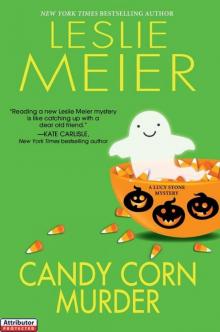 Candy Corn Murder
Candy Corn Murder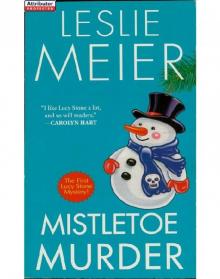 Mistletoe Murder
Mistletoe Murder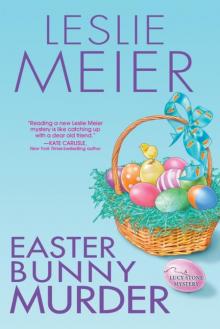 LStone 20 - Easter Bunny Murder
LStone 20 - Easter Bunny Murder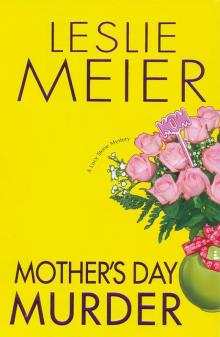 Mother's Day Murder
Mother's Day Murder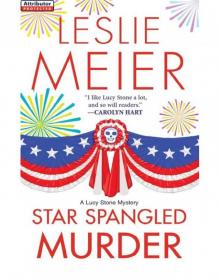 Star Spangled Murder
Star Spangled Murder Silver Anniversary Murder
Silver Anniversary Murder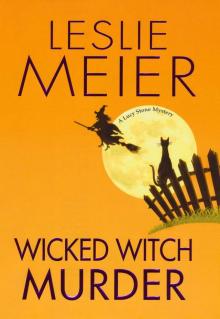 Wicked Witch Murder
Wicked Witch Murder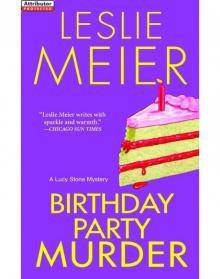 Birthday Party Murder
Birthday Party Murder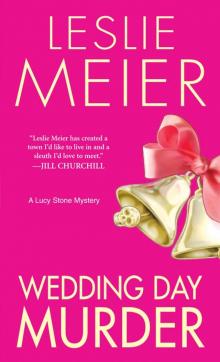 Wedding Day Murder
Wedding Day Murder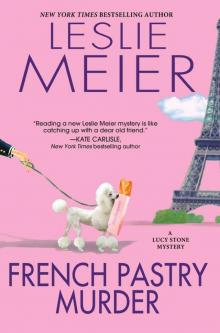 French Pastry Murder
French Pastry Murder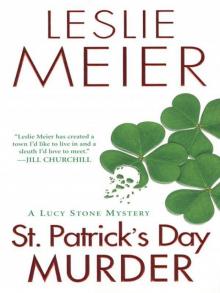 St. Patrick's Day Murder
St. Patrick's Day Murder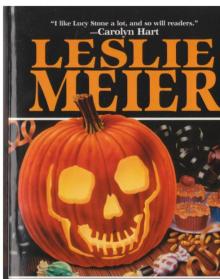 Trick or Treat Murder
Trick or Treat Murder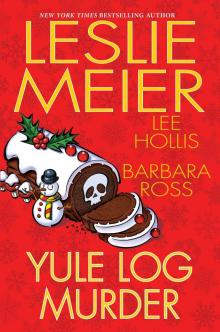 Yule Log Murder
Yule Log Murder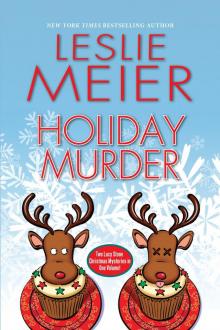 Holiday Murder
Holiday Murder British Manor Murder
British Manor Murder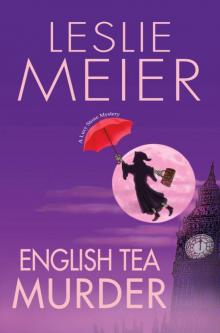 English Tea Murder
English Tea Murder